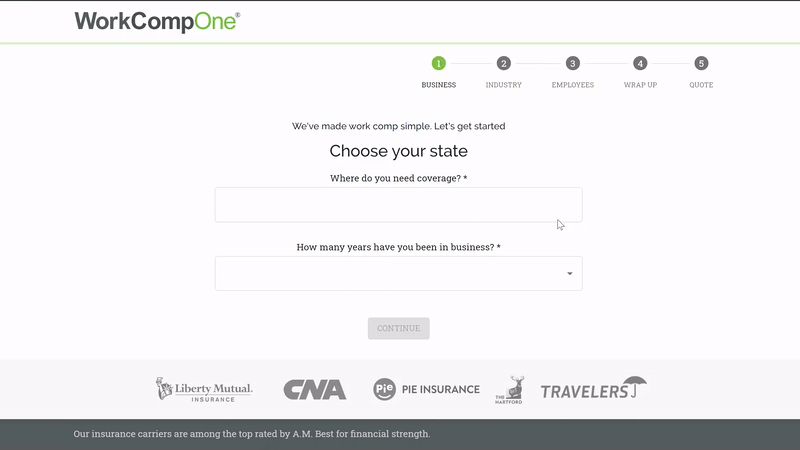If you run a small business and you’re going to be hiring employees, it’s wise to understand the workers’ comp laws in your state, how they affect you, and what you will need to do to cover your company and remain in compliance with government regulations.
Even if you only have five – or fewer – employees, you may need to carry workers’ compensation insurance, depending on your state. But you may not be sure how it works.
In this post, we cover workers' compensation insurance for small businesses with one to five employees, and what you need to know to protect yourself, your workers, and your business.
Do You Need Workers' Compensation Insurance for a 5 Employee Business?
In short, yes — most businesses are required by state law to carry workers' compensation insurance if they have one or more employees.
Workers’ compensation insurance is designed to provide medical benefits and wage replacement to employees injured during the course of employment.
Each state has different regulations for workers’ compensation that are based, in part, on the number employees at the company. Once a business reaches the “threshold” or minimum number of employees, the employer is required by state law to carry workers’ compensation insurance for their full employee payroll.
So the first thing you need to do is take an employee count. How many full-time employees do you have? How about part-time? Do you have temporary or seasonal workers? How about family members on your payroll?
With these numbers in mind, you can then learn more about your state’s specific requirements for coverage.
Workers’ Comp May Be Required in Your State, Even If You Have 5 or Fewer Employees
In some states like Alabama, you may not need workers’ comp until you have five or more workers – and in some, like Texas, you don’t need to have workers’ comp insurance at all.
But in others, such as Arizona, you need workers’ comp coverage even if you have just one employee. In fact, 36 different states and Washington, D.C. require employers to have workers’ compensation coverage if they have at least one employee of any kind. In some cases, you may even have to purchase workers’ compensation insurance if you’re a sole proprietor.
Another other important thing to note here is that any type of employee counts as a “full” employee when it comes to workers’ compensation. Full-time employees, part-time employees, and seasonal employees all count.
So if you have one full-time employee, two seasonal employees, and two part-time employees in 2022, you have a total of five employees – and if you live in a state with a five-employee threshold, you’ll need to buy workers’ comp insurance.
And while owners, officers, LLC members and sole proprietors might be able to opt-out of coverage, they can still count toward your total.
Also, the line of work that your business is in matters. For example, construction workers and other high-risk workers are often required to be covered by workers’ compensation insurance – even if your business doesn’t meet your state’s minimum threshold for coverage.
Workers' Compensation Requirements Vary by State
No two states are exactly alike. So if you’re worried about whether or not you need workers’ compensation insurance, the best place to start is with your state’s laws. This guide to workers’ comp by state from WorkCompOne is a great place to start.
It outlines the laws governing workers’ compensation in all 50 states + Washington, D.C., so you can get all the information you need about employee minimums, as well as lots of other details about workers’ comp in your state.
Other state-specific questions to answer include:
- Which types of employees count for workers’ compensation purposes?
- Do you have plans to hire more employees in the near future?
- Will you need coverage for out-of-state work?
Even Employers Below State Minimums May Be Liable For Work Injuries
So, let’s say you live in Alabama. You only have two workers for your small business. That means you don’t need to buy workers’ compensation insurance, right? And that will save you some money – which is always important for small businesses!
Well, that’s sort of true. But even if you’re not required to have coverage, it may still be a good idea to get workers’ compensation insurance. Just like car insurance, home insurance, or business insurance, a workers’ comp policy helps protect you and your business.
If a company doesn’t have workers’ compensation insurance and a worker is injured on the job, most states will allow the employee to sue their employer filing a personal injury claim. Not only is this a complex and expensive process, but the employer could be found liable for their injuries and forced to pay a costly settlement.
In this scenario, the worker can sue for full compensation, pain and suffering, lost wages, etc. This would open the employer up to far greater losses than if they had just carried a work comp insurance policy.
With workers’ compensation insurance, you don’t have to worry about that. In most states, it’s the “sole legal remedy” for injured workers. Worker’s compensation coverage will pay for medical costs, rehabilitation and lost wages for injured workers – and in most cases, the employer will also be covered (up to the policy limits) if the employee tries to sue for damages.
Even if work injuries are uncommon in your line of business, workers’ compensation provides valuable protection for you and your employees, too. So even if you have five or fewer employees and are not legally mandated to get workers’ compensation insurance in your state, it still may be wise to look into getting a policy.
How to Get Workers’ Compensation Insurance for a Very Small Business
You know you need workers’ compensation insurance, but that doesn’t make it any easier to purchase the right policy. Fortunately, there’s a relatively straightforward process you can follow to get the coverage you need:
1. Calculate Your Total Employee Payroll
Your premium is based largely on your payroll, which includes the type of job that each employee performs. Here’s what you need to record:
- The name of each employee who requires workers’ compensation coverage
- The employee’s wages (gross annual salary), rounded to the nearest thousand
- The employee’s job title and description of the work they do
For hourly workers, estimate projected payroll. The exact amount will be audited at the end of the policy year, and the business will be credited or debited accordingly.
It’s important that this information is as accurate as possible, as it’s used to calculate your premium. This post walks you through the process, step by step.
2. Find Your Industry Classification Code
Classification codes, also known as class codes, are four-digit codes used nationwide to categorize employees for workers’ compensation purposes.
For example, a person who works as a carpenter (5645 – Carpentry of Residential Dwellings Not Exceeding Three Stories) won’t have the same class code as someone employed as a donut shop (9083 – Donut Shop Retail).
Each class code has a rate associated with it, which is used to calculate the cost of coverage.
Tips:
- Make sure class codes are accurate, as a mix-up has the potential to cost you a lot of money.
- An insurance agent that specializes in workers’ comp will ask targeted questions to help you identify the right class code.
3. Shop Around
Just the same as any type of coverage – such as car insurance for company vehicles – shopping around can help you secure a policy at a competitive rate.
You have two options:
- Personally shop around by contacting several carriers
- Use an independent agent to handle this process for you
If you’re the hands-on type, personally contacting several carriers allows you to remain engaged with every step of the process. However, it also requires more of your time.
With an independent agent, you can remove yourself from the process, which saves you time, while still knowing that you’ll secure the best deal in the end.
Need Help Finding Coverage For Your Small Business? Get Help Buying Your First Workers’ Comp Policy
Sometimes, it’s hard for small businesses to find coverage, especially if your business is new and has not had workers’ compensation coverage in the past. New businesses don’t have a long track record of safety, which can make coverage more expensive and harder to find.
Small businesses also have a smaller payroll. Since your payroll is what helps determine your premiums, that means that fewer insurance companies serve small businesses. And that’s where WorkCompOne comes in.
Serving small businesses is our specialty. With us, you can get a quote and find an insurer in minutes, and we’ve made it simple for first-time buyers to receive a quote and purchase a policy. So don’t wait.
WorkCompOne offers:
- A fast, easy quoting experience — available online, 24/7.
- No bundling required. Policies tailored to small businesses that want workers' comp, and only workers' comp.
- Coverage from leading insurance carriers like The Hartford, Coterie, EMPLOYERS and more.
And we've made it easier than ever to get the coverage you have to have, for the best price available.






